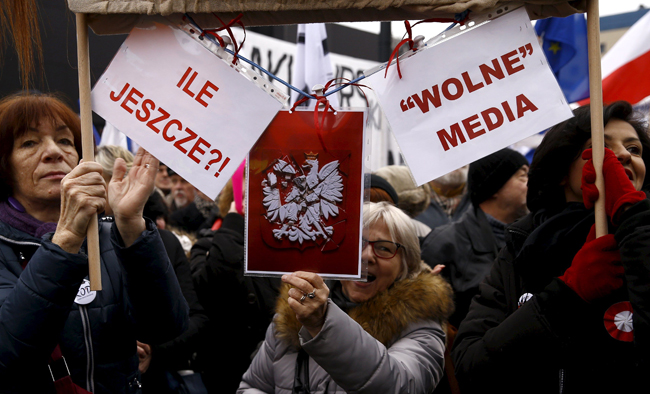Kaczynski and the “Putin model”
Expert: “The Warsaw-Brussels conflict can weaken the positions of the EU as a whole, which is bad for Ukraine”
The forecast of the Gazeta Wyborcza editor-in-chief Adam Michnik seems to be coming true. Well before the presidential election runoff past May, he said black days were in store for the country. The well-known Polish dissident meant a predictable victory of Andrzej Duda who represented the then opposition conservative party Law and Justice (PiS).
Michnik’s prediction came true, when mass-scale demonstrations erupted in protest against the conservative government’s actions, including the enactment of two controversial laws – on the constitutional court and the mass media. What stirred up the most scathing criticism inside the country and in Brussels were amendments to the mass media law, which envisages appointment and dismissal of state-run media managers by Poland’s Ministry of Finance. Formerly, they were selected by the National Radio and Television Board.
European Parliament President Martin Schulz has accused the new Polish government of practicing Russian-style politics and, moreover, claimed that this approach is incompatible with the European Union’s basic values. Viviane Reding, former European Commissioner for Justice, Fundamental Rights and Citizenship and current Member of the European Parliament, has also drawn a parallel between Poland and Russia. “The attack on the rule of law always begins with an attack on the constitutional court, followed by attacks on the public and private media. This is the logic of Putin, Orban, Kaczynski,” Reding told the Frankfurter Allgemeinen Sonntagszeitung. The MEP believes that Europe must help Polish civil society to gain strength.
Meanwhile, journalist Alex Spence wrote in Politico.eu: “A move by Poland’s new conservative government to take control of the state-owned broadcaster has left journalists, human rights activists and free speech campaigners in Europe with an anxious sense of deja vu… Critics say Poland is following the script used by Prime Minister Viktor Orban to reshape Hungary’s media landscape in the past five years.”
To tell the truth, this kind of assumptions are not groundless. Past Wednesday the PiS leader Jaroslaw Kaczynski met Viktor Orban, leader of the Hungarian right-wing conservative party Fidesz. The media report that the six-hour-long meeting, which the ruling circles of Warsaw and Budapest were stubbornly refusing to confirm, was held at a guest house in Nidzica, southern Poland.
It is worthwhile to note the reaction of the Polish leadership to preoccupation in Brussels. “I want to emphasize that no pressure, calls and words, which must be never pronounced, especially from the mouths of Germans, will ever make us veer off the road we [the PiS-led coalition. – Ed.] have chosen. We will not make a U-turn, we will march forward,” the media quote Kaczynski as saying. Moreover, the German Ambassador to Warsaw, Rolf Nikel, was summoned to Poland’s Foreign Ministry past Monday in connection with what the Polish ministry calls “anti-Polish comments of German politicians.”
COMMENTARY
“INSTEAD OF STRENGTHENING POLAND AND ITS POSITIONS IN THE EU OR NATO, THE ACTIONS OF THE NEW POLISH GOVERNMENT CAN ONLY WEAKEN THEM”
Volodymyr HORBACH, political expert, Institute of Euro-Atlantic Cooperation, Kyiv:
“It would be a serious mistake to impose sanctions against a European Union member. Jean-Claude Juncker, President of the European Commission, has already opposed this idea. But the foreign-policy and public pressure of politicians on the new Polish leadership calls to mind the relations between Brussels and the leader of another state, a relatively new EU member. It is Viktor Orban, the Prime Minister of Hungary. This pattern is also true of Kaczynski’s Poland. In this case, European institutions follow patterns and stereotypes to a certain extent, extending the experience of dealing with Orban onto the new Polish government. Sometimes there are real grounds for this – in other words, the Poland of Kaczynski or the Poland of PiS gives cause to do so. I think their relations with Brussels will follow the algorithm of relations between Orban and Brussels. But things will not go as far as imposing sanctions within the EU.
“Instead of strengthening Poland and its positions in the EU or NATO, these actions of the new Polish government can only weaken them. In other words, this internal conflict, the conflict between Warsaw and Brussels or, potentially, between Warsaw and Berlin can weaken the positions of the EU as a whole, which is bad for Ukraine.”
Interviewed by Natalia PUSHKARUK
Newspaper output №:
№1, (2016)Section
Day After Day





